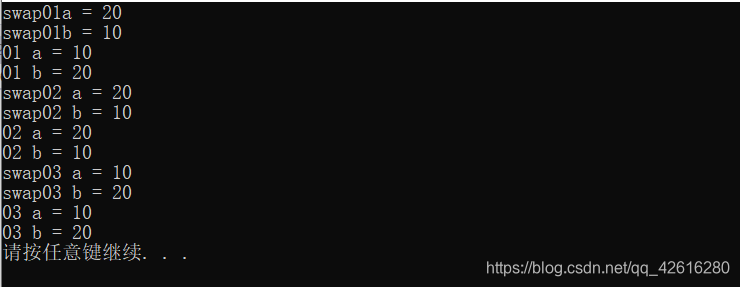一、C++中的引用
1、引用的基本使用
给变量起别名
语法:数据类型 &别名 = 原名
示例
#include<iostream>
using namespace std;
int main()
{
int a = 10;
int &b = a;
cout << "a = " << a << endl;
cout << "b = " << b << endl;
a = 100;
cout << "a = " << a << endl;
cout << "b = " << b << endl;
b = 200;
cout << "a = " << a << endl;
cout << "b = " << b << endl;
system("pause");
return 0;
}
输出结果

2、引用注意事项
-
引用必须初始化
-
引用在初始化后,不可以改变
示例
#include<iostream>
using namespace std;
int main()
{
//int &a;//错误,引用必须初始化,展示是谁的别名
int a = 10;
int b = 20;
int &c = a;
//引用 在初始化后不可更改
c = b;//这是正确的,因为这是赋值操作
cout << "a = " << a << endl;
cout << "b = " << b << endl;
cout << "c = " << c << endl;
system("pause");
return 0;
}
输出结果

3、引用做函数参数
函数传参时,可以利用引用的技术让形参修饰实参,
可以简化指针修改实参
(类似地址传递)
示例
#include<iostream>
using namespace std;
//1、值传递
void swap01(int a, int b)
{
int temp = a;
a = b;
b = temp;
cout << "swap01a = " << a << endl;
cout << "swap01b = " << b << endl;
}
//2、地址传递
void swap02(int *a, int *b)
{
int temp = *a;
*a = *b;
*b = temp;
cout << "swap02 a = " << *a << endl;
cout << "swap02 b = " << *b << endl;
}
//3、引用传递
void swap03(int &a, int &b)
{
int temp = a;
a = b;
b = temp;
cout << "swap03 a = " << a << endl;
cout << "swap03 b = " << b << endl;
}
int main()
{
int a = 10;
int b = 20;
swap01(a, b);
cout << "01 a = " << a << endl;
cout << "01 b = " << b << endl;
swap02(&a, &b);
cout << "02 a = " << a << endl;
cout << "02 b = " << b << endl;
swap03(a, b);
cout << "03 a = " << a << endl;
cout << "03 b = " << b << endl;
system("pause");
return 0;
}
输出结果

4、引用做函数返回值
引用是可以作为函数的返回值存在的
【注意】 不要返回局部变量引用
用法:函数调用作为左值
示例
#include<iostream>
using namespace std;
//不要返回局部变量的引用
int& test01() //相当于用引用的方式返回
{
int a = 10;
return a;
}
int& test02()
{
static int a = 10;//静态变量存放在全局区,不会自动释放
return a;
}
int main()
{
int &ref = test01();
cout << "ref = " << ref << endl;//第一次结果正确,以为编译器对其值进行保留
//cout << "ref = " << ref << endl;//第二次结果错误,因为该值已被释放
int &ref02 = test02();
cout << "ref02 = " << ref02 << endl;//不论再次调用多少次,都会正常执行
cout << "ref02 = " << ref02 << endl;
system("pause");
return 0;
}
引用的本质:在C++内部实现是一个指针常量
指针常量:指针的指向不可以改变,但是指针的值可以改变
常量引用:主要用来修饰形参,防止误操作
在函数列表中,可以加const修饰形参,防止形参改变实参
加上const 之后变为只读,不可以修改(类似地址传递处)
二、函数提高
1、函数默认参数
在C+++中,函数的形参列表中的形参是可以有默认值的
语法:返回值类型 函数名 (参数 = 默认值){ }
函数声明和函数实现只能有一个默认参数
示例
#include<iostream>
using namespace std;
int func(int a, int b, int c ); //函数声明
int main()
{
cout << "不给默认值传入参数";
cout << func(10) << endl;
cout << "给默认值传入参数";
cout << func(10,20) << endl;
system("pause");
return 0;
}
//函数实现
//如果自己在主函数中传入参数,则就用传入的参数,如果没有传入,则用默认值
int func(int a, int b = 10, int c = 30) //如果给了b默认参数,则b右边的参数都得有默认参数
{
return a + b + b;
}
2、函数占位参数
C++中函数的形参列表里可以有占位参数,用来做占位,调用函数时必须填补该位置
语法:返回值类型 函数名 (数据类型) { }
示例
#include<iostream>
using namespace std;
//占位参数
void func1(int a, int )
{
cout << "hello world" << endl;
}
//占位参数可以有默认值
void func2(int a, int = 10)
{
cout << "hello world" << endl;
}
int main()
{
func1(10, 1);//占了位就必须往里面传数
func2(10); //占位参数有默认值时,可以不传入数据
system("pause");
return 0;
}
3、参数重载
函数名可以相同,提高复用性
函数重载满足条件
-
同一个作用域下
-
函数名称相同
-
函数参数类型不同或者个数不同或者顺序不同
函数的返回值不可以作为函数重载的条件
示例
#include<iostream>
using namespace std;
//1、func函数都在全局域
//2、函数名不同
//参数类型不同 符合函数重载条件
void func()
{
cout << "func 的调用" << endl;
}
void func(int a)
{
cout << "有参数的func 调用" << endl;
}
int main()
{
func();
func(10);
system("pause");
return 0;
}
函数重载的注意事项
- 引用作为重载条件时
- 函数重载碰到函数默认参数
示例
#include<iostream>
using namespace std;
//1、引用作为重载条件
void func(int &a) //int &a=10;是不合法的语法,所以腐女吧(10)无法调用此函数
{
cout << "func(int &a) 的调用" << endl;
}
void func(const int &a)
{
cout << "func(const int &a) 的调用" << endl;
}
//2、函数重载碰到默认参数
void func2(int a,int b = 10)
{
cout << "func(int a,int b) 的调用" << endl;
}
void func2(int a)
{
cout << "func(int a) 的调用" << endl;
}
int main()
{
int a = 10;
func(a);
func(10);
//func2(10);//当函数重载有默认参数时,出现两个够可以调用的情况,会出错
system("pause");
return 0;
}
【注释】 学习课程为-黑马程序C++教程